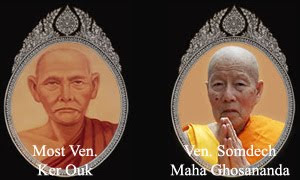The path refers to principles of practice leading to the cessation of suffering or the self-training to get rid of the cause of suffering. This truth defines the Buddhist way of life. It contains all the ethical teachings and practices of Buddhism. It provides the ways and means to realize the goal set forth in the Third Truth. This way is called the Noble Eightfold Path, since it consists of eight factors. It is also known as the Middle Way. The eight components are as follows:
Right Understanding, Right Thought, Right Speech, Right Action, Right Livelihood, Right Effort, Right Mindfulness and Right Concentration.
The Noble Eightfold Path can be explained thusly:
1. Right Understanding is the knowledge of the Four Noble Truths. In other words it is the understanding of oneself as one really is. The keynote of Buddhism is this Right Understanding. Buddhism as such is based on knowledge and not on unreasonable belief.
2. Right thoughts are threefold. They are the Thoughts of:
- Renunciation: Nekkhamma Sankappa, which are opposed to lustful desires.
- Benevolent Thoughts: Apāpada Sankappa, which are opposed to ill-will, and
- Thoughts of Harmlessness: (Avihimsā Sankappa) which are opposed to cruelty. These tend to purify the mind.
3. Right speech deals with refraining from falsehood, slandering, harsh words and frivolous talks.
4. Right Action deals with refraining from killing, stealing, and unchastity.
5. Right Livelihood deals with the five kinds of trades, which should be avoided by a lay disciple. They are trading in arms, human beings, flesh (that is, breeding animals for slaughter), intoxicating drinks, and poison. Hypocritical conduct is cited as wrong livelihood for monks.
6. Right Effort is fourfold - namely,
- The effort to avoid (Samavara-padhāna); incite the will to avoid the arising of evil, unwholesome things which have not yet arisen.
- The effort to overcome (Pahāna-padhāna); incite the will to overcome the evil, unwholesome things which have already arisen.
- The effort to develop (Bhāvanā-padhāna); incite the will to arouse wholesome things which have not yet arisen.
Develop the Seven Factors of Enlightenment (Bojjhanga)
1. Mindfulness (Sati)
2. Investigation of the Law (Dhamma-vicaya)
3. Energy (Viriya)
4. Rapture (Piti)
5. Tranquillity (Passaddhi)
6. Concentration (Samādhi)
7. Equanimity (Upekkhā)
- The effort to maintain (Anurakkhanā-padhāna); incite the will to maintain the wholesome things which have already arisen, and not to allow them to disappear, but to bring them to growth, to maturity and to the full perfection of development.
7. Right Mindfulness is also fourfold. It is the Four Foundation of Mindfulness (Mahāsatipatthāna);
- Contemplation of The Body (Kāyā-nupassanā)
- Contemplation of The Feelings (Vedanā-nupassanā)
- Contemplation of The Mind (Cittā-nupassanā)
- Contemplation of The Mind-Objects (Dhammā-nupassanā)
8. Right Concentration is the one-pointedness of the mind. It means “focusing the mind.” The practice of meditation leads to full understanding of the impermanence of things and eventually to Nibbāna.
The first two are grouped in Wisdom - Paññā, the second three in Morality - Sīla, and the last three in Concentration - Samadhi.
1. Sīla: Right Speech, Right Action, Right Livelihood
2. Samādhi: Right Effort, Right Mindfulness, Right Concentration
3. Paññā: Right Understanding, Right Thoughts





0 comments:
Post a Comment